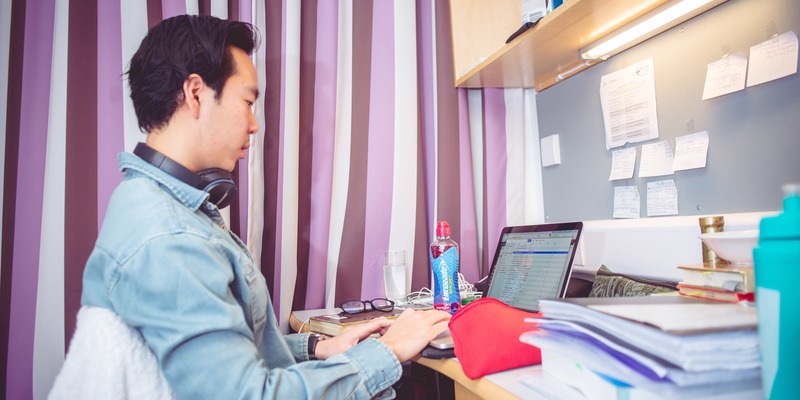If you know you’ll be studying abroad in the near future, then there’s a lot to get ready before the big moving day arrives. Before you can start this new and exciting chapter of your life, there are some steps you’ll need to take and things you should do. To make sure you’ve done everything you need to, here’s how to prepare for study abroad.

12 months to go...
1. Apply for a passport
Before you can start your degree abroad, you need to make sure you have a valid passport to study abroad. If you have an existing passport but it’s set to expire within six months, then you need to apply for a new one. It’s important that you get your ID documents sorted well before your course start date.
2. Apply for a visa
Visas can be a little tricky to sort out, so make sure to head over to this UK visa information blog for all of the details you’ll need. Different factors, like your age and where you’re from, can influence the visa application process. This is why it’s so important to be thinking about visas 12 months before you plan to move abroad, giving you plenty of time to finalise things.
3. Take the IELTS exam
If you’re an international student that’s moving to the UK, you also need to prove that you can handle the assignments and lectures that are given in English. To do this, you’ll need to have taken the IELTS (International English Language Testing System) exam and include the results in applications.
4. Sort out your accommodation
Depending on the university’s specific process, you may be able to apply for accommodation around this point in time. Keep in mind that not all universities allocate accommodation based on when applications are made. So, acting fast won’t necessarily secure you your chosen site.
At Newcastle University, our team starts processing applications from 30 June so be sure to apply before then. If you apply after 30 June, there’s a chance your application might be processed after those who applied before.
However, there’s no downside to planning ahead so certainly go ahead and research as many accommodation options as you want before applying. That way, you can start thinking about which flats or halls you might want to stay in.
6 months to go...
5. Consider your health
It’s important that you bring a copy of your medical records along with you in the highly unlikely event of an emergency. You’ll need to consider the country’s policy on vaccines and make sure you’re up to date if necessary. If you regularly take medicine to treat an ongoing condition, then you’ll need to make arrangements to ensure you can still access them after you’ve moved.
6. Buy a plane ticket
In the excitement, it can be easy to leave actually booking your flight longer than you probably should. We’d advise keeping an eye on ticket prices so that you aren’t hit with a large bill just before you leave. Some airlines offer student discounts so make sure to take advantage of that if possible.
Also, think about your luggage allowances and how much you plan on taking.
7. Get to know your new home
To ease any possible confusion when you arrive in your new home for the next few years, carry out as much research as possible. Find the best restaurants to dine at, sights to see and clubs you want to be a part of at the university. There are plenty of videos, blogs and forums that you can turn to so that you’re ready to go.
8. Refresh your language skills
You’ll already have a good understanding of the language of the country you’re staying in. As we’ve already said, if you’re coming here to the UK, you’ll need to have taken the IELTS (International English Language Testing System) exam. But, this is a good opportunity to discover specific slang and dialects that you might encounter.
3 months to go...
9. Get a head start on the reading
With three months to go until your start date, you’ll probably have received reading lists and module information. Now is the perfect opportunity for you to source the textbooks you need and make a start on the reading.
Having a good understanding of the topics you’ll be studying before you arrive will help you to make a great first impression.
10. Look into exchanging currency
You should have a small amount of cash ready for when you travel to make quick and easy purchases. The first few days will be busy so it’s better to be prepared and have the cash you need, rather than being unable to withdraw any because you’ve encountered some kind of problem.
If there is any kind of slight issue after you’ve arrived, you can get in touch with the university’s international student support team for advice and guidance.
11. Tell your bank where you’ll be going
If you don’t keep your bank updated with your long-term plans, then they may believe transactions you make when you arrive are fraudulent. Letting them know ahead of time will ensure your account isn’t locked by mistake.
1 week to go...
12. It’s time to start packing
Start packing at least a week before you plan to leave as this gives you enough time to buy anything extra you don’t have. Make a list beforehand of everything you need to take and what you plan to buy in the first few days after you arrive.
If you’re worried that you’re going to forget something important or you’re not sure where to start, then don’t panic. We’ve put together a helpful preparation checklist that you can tick off as you pack. It’ll make sure you have all of the clothes, electronics and documents you need to start the exciting next chapter of your life.
Download your free copy now using the link below.
